- Home
- Edward Lee
Succubi Page 3
Succubi Read online
Page 3
Her parents were actually happy about it, something for which she’d never really forgiven them. She’d never seen Mark again. Melanie had been about five at the time; she barely even remembered who her father was.
Ann’s first years with the firm had been so harried she’d had no social life at all. The few dates here and there were never allowed to amount to anything, not as a lawyer and a single mother. One day it dawned on her that three years had gone by without her having sex once. She couldn’t expect many men to want to assume the role of husband to a woman who worked ten to twelve hours a day six days a week and had a pensive teenage daughter by another man.
But Martin had been different. She’d met him at the college; the firm had purchased a computer system, and Ann had been required to take a three day word processing course. Martin had been sitting in the cafeteria, smoking over a pile of student essays about the thematics of Randall Jarrell. He’d merely looked up, made some small talk, and asked her out for a drink. They’d had a nice, polite, and innocuous time at the Undercroft, and that had been that. A week later they were dating regularly. What helped was that his writing schedule conformed to her work schedule. There was never any tension there, and she never had to force herself to go out when she was too tired. Before he’d moved in with her and Melanie, he’d laid it all right out. “I’m a poet, this is my only occupational aspiration. I write six to eight hours a day, every day, and I teach part time at the college. I could teach full time and take extra classes for more money, but if I did that, my writing would suffer. I will never do that. I’ll probably never make more than twenty thousand a year. Before we go any further with this, I want you to know that. I want it all on the table so there won’t be any misunderstandings later. A poor poet is all I will ever be.” Were all men so money conscious? Ann had never doubted her love for him; she didn’t care how much money he made as long as he loved her. And she never doubted that either.
Martin was a good househusband. He taught two classes on Tuesday and Thursday mornings. The other days he wrote from morning to dinnertime. He liked routines; “psychical and creative order,” he called it. He’d take Melanie to school every morning, then he’d go home and write or go to school and teach, then he’d write some more and pick Melanie up. He cooked all their meals (all writers were good cooks) and even washed the dishes! He split the laundry and cleaning chores with Melanie. Many nights Ann wasn’t home for dinner, but that had never been a problem either. Melanie had taken to him instantly. He encouraged her and counseled her better than Ann could ever expect to, and since they were both flaming liberals, they both agreed on everything. Martin even liked Melanie’s wild, discordant music. At least once a month he would drive her and some of her friends to one of the New Wave clubs in D.C. to see bands like the Car Crash Symphony, Alien Sex Fiend, and Nixon’s Head. “Nixon’s Head!” Ann had once tiraded. “You took her to see a band called Nixon’s Head?” “Creative alternativism, my dear,” Martin had quietly responded. “Without it we’d be another Red China.” Maybe Ann was stupid but she didn’t understand how a group called Nixon’s Head could be proof of democracy. Nevertheless, without Martin, Melanie would have no father figure at all, and would probably have run away for good by now. Martin was tolerant of things most men could never be: stable, kind in the face of her job stress, never jealous, and someone who wouldn’t rant and rave every time she had to work late on depositions or had to take clients out to restaurants where dinner for two cost more than Martin made in a week. He didn’t feel subservient at all; he even jokingly referred to himself as her “wife.” He insisted on contributing the little he could toward the mortgage, and refused to let her replace his ten year old Ford Pinto with a Corvette. “People will think I’m your gigolo,” he’d objected. “Any poet who doesn’t drive a ten year old car with at least 150,000 miles on it is a complete fake.”
His first proposal had been made in good humor. “If you don’t marry me soon, the neighbors’ll think all I’m good for is sex.” “That’s not true, Martin. You’re also a very good cook. Let’s talk about it later.” The second time had turned ugly. “I’m not comfortable with the idea of marriage right now,” she’d said, now twice turning down the ring which he must’ve saved years for. “Why?” he asked. “Because I was married once before and it didn’t work out,” she said. “It’s not my fault you married an asshole!” he yelled back. She’d felt terrible about it for days because his point was legitimate. Part of it was she didn’t want to be married until she knew she was occupationally secure.
But was that really the problem?
What’s wrong with me? she thought.
«« — »»
Getting Melanie to dress appropriately had been like pulling teeth. “Yes, you’re going,” Ann had ordered. “And, no, you can’t wear leather pants and that Rob Zombie T shirt.” It had been Martin, of course, who’d convinced her. “Conforming to conformity is a statement too, isn’t it?” he’d asked. Melanie had then actually put on a dress without another word. “I feel like a yuppie,” she’d said, grinning as the hostess had seated them by the window. The Emerald Room was indeed the best restaurant in town. The state legislature had their power lunches here every day while in session, and brought plenty of lobbyists for dinner. The governor appeared weekly, and the county executive often came in late. Any celebrity who happened to pass through town always wound up here via the recommendations of other celebrities. Stallone was once overheard remarking to a producer: “Preeminent grub.”
“What exactly does being a partner mean, Mom?” Melanie asked.
“It means I share in all the firm’s profits.”
It also meant sharing in all the responsibilities, but Ann wasn’t worried about that. She’d snagged their biggest client, Air National, herself, and had managed to hold on to them twice as long as any other firm. It was a sleazy acknowledgment, but the best thing about representing an irresponsible airline was that they paid any amount to get out of hot water. What partner meant most of all, though, was more delegation, and that meant more time she could spend with Martin and Melanie. From now on it would be the associates who scrambled over interrogatories till 3 a.m. Maybe now things would evolve into the domestic solvency she knew she needed. Maybe now they could be a family.
The maître d’ expertly reeled off the day’s specials and left them to peruse leather bound menus.
“How’re things going at school?” Ann asked.
“Okay,” Melanie meekly replied. Okay meant no D’s on the horizon. She was a smart girl but just couldn’t adjust. Before Martin, she’d been cutting class, failing all her subjects. But then she beamed: “I’m gonna get an A in my art class.”
Art, Jesus, Ann thought. “Melanie, art isn’t going to get you very far in this world.”
“Rembrandt would probably disagree with that statement,” Martin said, and discreetly scowled at her.
“What I mean, honey, is that art doesn’t usually make a good living. Art never sells till after the artist is dead.”
Martin was still scowling. “Your mother’s right, Melanie. Peter Max only makes $500,000 a week. Last year Deniere sold a twelve inch canvas for seventeen million. A person could starve on that kind of money.”
There I go again, Ann thought. Martin’s jovial sarcasm was his way of objecting to Ann’s negativity. What Melanie needed was maternal support, not criticism. More and more she feared Martin was totally right, that Melanie’s maladjustment stemmed from a lack of such support. Ann’s own parents had been infuriated by her decision to attend law school. “Lawyers are sharks, liars,” her mother had said. “It’s not a job for a woman.” “You’ll never cut it as an attorney, Ann. It’s too tough out there,” her father had assured her. Ann doubted that she’d ever been hurt so badly in her life, and now she felt worse. How many times had she hurt Melanie with similar ridicule?
“I’m sorry, honey,” she said, but it sounded terribly fake.
Martin quickly changed the subje
ct with more comedy. “What kind of dump is this? No chili dogs on the menu.”
“Don’t worry, dear,” Ann said. “I’m sure they’ll bring your foi gras and Beluga caviar on a hot dog roll if you ask them.”
“They damn well better unless they want me to start tipping tables over. And they better bring me catsup for my fries too. “
Melanie loved it when Martin poked fun at the establishment, or at least where the establishment ate. But Martin turned serious when they deliberated over appetizers. “Jesus.” He leaned forward and whispered. “The poached salmon costs seven bucks. That’s a lot of dough for an appetizer.”
“Don’t worry about it, Martin,” Ann assured. “This is my celebration dinner, remember? Cost is no object.”
“I don’t want an appetizer,” Melanie said. “I’d rather have a beer.”
“You’re too young to drink beer,” Ann reminded her.
Then Martin: “I’ll have the oysters Chesapeake. That’s two bucks cheaper than the salmon.”
Ann didn’t know whether to laugh or scream. Would you get the fucking salmon and shut up? she felt like saying. I just got a forty thousand dollar raise today. I think I can handle a seven-dollar appetizer! “I’ll order for everyone,” she said instead. “It’ll save trouble.”
A beautiful redhead took their orders, as robotic attendants brought bread and filled their water glasses. Martin and Melanie chatted about local art shows, during which three different opposition attorneys appeared to congratulate Ann on her partnership. This surprised—even startled—her, the enemy camps acknowledging her success without so much as a hint of jealousy. “You seem to be quite the talk of the local legal world,” Martin suggested when Melanie excused herself to go to the ladies’ room.
“It’s a strange feeling.”
“I’m very happy for you,” he said.
He was, she could tell. So why wasn’t she? Ann felt skewed; making partner still felt numbly distant. Why? “I’ll be home more now,” she said. “I’ll be able to get Melanie off your back a little.”
“Ann, she’s a great kid, she’s no trouble at all. I think she’s really starting to come out of her shell now.”
“No help from me.”
“Would you stop? Everything’s working out great, isn’t it?”
Actually it was. Ann just didn’t understand why she didn’t feel that way herself. Everything was working out.
“Are you all right?”
“What?” she said.
“You look pale all of a sudden.”
Ann tried to shake it off. She felt pale too. “I don’t know what’s wrong. I’ll snap out of it.”
“You’ve been working too hard,” Martin suggested. “It’s no wonder. And then this nightmare business…”
The nightmare, she thought. The hands on her.
“That’ll work out too—you watch,” Martin said, and sipped his Wild Goose lager. “It’s all stress related. All the hours you put in, plus worrying about Melanie, it gangs up on you. Harold’s a great doctor. I know a bunch of profs at the college who see him. The guy works wonders.”
But was that really the answer to her problem? Ann wasn’t even sure what her problems were. Beyond the great window, the city extended in glittery darkness. The moon suspended above the old post office; it seemed pink. Ann was staring at it. Its gibbous shape fixated her, and its bizarre pinkness.
“Mom, are you okay?” came Melanie’s voice.
Now they were both giving her long looks. “Maybe we should go,” Martin said. “You need to get some rest.”
“I’m fine, really,” she feebled. “Once I eat something, I’ll be fine.”
Ann had to force herself to act normal, but everything distracted her. Subconscious ideas of reference, Dr. Harold had called it. Image symbolization. Even irrelevancies reminded her of the nightmare. The glass candle orb on the table. The pretty hands of the waitress as she set out their appetizers. The fleshy pinkness of Martin’s poached salmon, like the pink flesh of the dream which seemed the same eerie pink as the bulbous moon beyond the window. The moon looked bloated, pregnant.
She was pregnant in the dream. Her belly was stretched huge and pink. Then she saw the faces…
The faceless faces.
“Some guy called you a bunch of times yesterday,” Melanie said. “I asked what he wanted but he wouldn’t say.”
Martin looked up. “Did his voice sound—”
“It sounded creepy, like he had a chest cold maybe.”
The same person Martin had mentioned. “It’s probably somebody selling magazine subscriptions,” Ann attempted. But now her curiosity was festering. She didn’t like the idea of someone calling her and not knowing who or even why.
“Whoever he is, I’m sure he’ll call back,” Martin remarked. “I’m a little curious myself now.”
Ann felt a little better when she got something in her stomach. Her glazed Muscovy duck appetizer had been prepared to perfection, and Martin devoured his poached salmon. But Ann realized that her sudden weird behavior had dampened the entire evening. Melanie and Martin were good sports but it showed. They knew something was wrong. Again, Ann struggled to make conversation, to normalize. “I’ll be able to drive Melanie to school most mornings,” she said, but the fact assailed her. Melanie had been in high school two years now, and Ann didn’t even know what the place looked like. She didn’t even know where it was. Martin had registered Melanie.
“Next week I figure I’ll take her to some of the museums in the District,” Martin said. “Too bad you can’t get off.”
Ann didn’t know what he was talking about. “Museums?”
“Sure, and some of the galleries.”
“I’ve always wanted to go to the National Gallery,” Melanie said.
This observation made Ann feel worse; it was just another thing she’d been promising Melanie for years but had never made good on. Still, though, she didn’t understand. “Martin, how can you take her downtown? She has school.”
Martin tried not to frown at her neglect. “It’s spring break, Ann. I’ve been reminding you for weeks.”
Had he been? God, she thought. She remembered now. It had slipped her mind completely.
“Melanie’s off for the whole week, and so am I,” Martin said.
A vacation, it dawned on her. It would be perfect. “I’m sorry, I forgot all about it. We’ll go someplace, the three of us.”
Martin looked at her funny. She hadn’t had a vacation in years, and in the past, whenever he brought it up, an argument usually resulted. “You serious? They’ll give you a week off just like that?”
“Martin, I’m one of them now. I can take off whenever I want provided everything’s in order.”
Martin looked incredulous, poised over his salmon. “This I don’t believe,” Melanie scoffed. “Mom’s going to take time off? That’s a change.”
“A lot of things are going to change now, honey,” Ann assured her.
Melanie was ecstatic. “I don’t believe it. I’m finally going to get to see the National Gallery and the Corcoran.”
“Since your mother’s talking mighty big now,” Martin added, “maybe she can do you one better. Maybe Giverny. Maybe the Louvre.”
They think I’m bullshitting? Ann couldn’t help but smile. Finally, she could do something for them that involved her. “It’s settled, then,” she stated. “This weekend we leave for Paris.”
Melanie squealed.
“You better check with your bosses first,” Martin suggested. “We don’t want to get our hopes up for nothing.”
“Don’t you understand, Martin? I am one of the bosses now. This’ll be great. Paris. The three of us together. The timing couldn’t be better.”
That much was true. The timing couldn’t have been better. But what Ann Slavik didn’t realize just then was that the circumstances couldn’t have been worse.
—
Chapter 2
They never came to him here. They could,
he knew, if they wanted to, but there was no reason. He could still see them in his mind and in his dreams; he was always dreaming of them: their swollen, perfect breasts, their beautiful bodies glazed in sweat and moonlight, their unearthly faces. They were like the drugs he used to take, euphoric, potent without mercy. In his dreams he remembered how he’d cowered before them in the promise of flesh. Five years ago they hadn’t been dreams at all.
The phone rang and rang. No one home, he thought, and hung up. He retrieved his quarter and dime and waited.
“Hurry it up,” Duke complained. “I’m missin’ Ping Pong.”
“Just a few more minutes,” Erik grated. “Please.”
Duke shrugged. “It’ll cost ya, fairy.”
Yeah, he thought. “All right. Five minutes?”
Duke grinned.
Erik Tharp didn’t even care anymore. He was doing what he had to do. “The Rubber Ramada,” the staff called this place. It was the state mental hospital. He’d been locked away, forgotten, but that was good, wasn’t it? The world had forgotten about him now, after five years. But so had they.
They’d never been able to control him as well as the others. They had no use for people they couldn’t control. The kid thing had been a frame; Erik hadn’t done any of it. He’d dug for them, sure, and he’d snatched some people. But he hadn’t murdered those kids.
Duke was another story; he was crazy. Not like the schizoaffectives or the delusional psychotics. He was just plain don’t give a shit, mean ass crazy. Ganser syndrome, it was called, He belonged in prison, not here. He’d made up a story in court about how aliens from the Orion complex communicated through a transmitter that had been implanted in one of his fillings. “The dentist was in on it,” he’d told the judge. “They forced me to do it.” He raped a sixteen year old girl and cut off her arms. “They said they needed the arms,” Duke had informed the jury. “Never said what for, though. Just bring us the arms.” He’d been found not guilty by reason of clinical insanity. In a state like this, Duke would never walk the street again.

 In the Year of Our Lord 2202
In the Year of Our Lord 2202 The Minotauress
The Minotauress Terra Insanus
Terra Insanus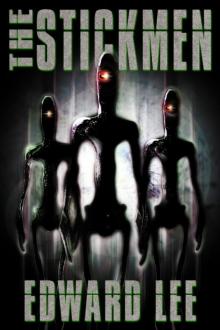 The Stickmen
The Stickmen Flesh Gothic by Edward Lee
Flesh Gothic by Edward Lee Family Tradition
Family Tradition You Are My Everything
You Are My Everything The Backwoods
The Backwoods The Teratologist
The Teratologist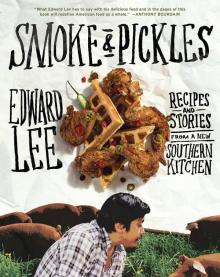 Smoke and Pickles
Smoke and Pickles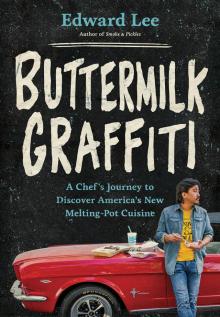 Buttermilk Graffiti
Buttermilk Graffiti Dahmer's Not Dead
Dahmer's Not Dead Quest for Sex, Truth & Reality
Quest for Sex, Truth & Reality The Innswich Horror
The Innswich Horror Brides Of The Impaler
Brides Of The Impaler Goon
Goon Trolley No. 1852
Trolley No. 1852 Sacrifice
Sacrifice Monster Lake
Monster Lake Succubi
Succubi Lucifer's Lottery
Lucifer's Lottery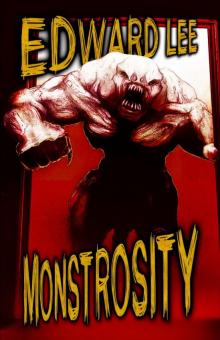 Monstrosity
Monstrosity The House
The House The Dunwich Romance
The Dunwich Romance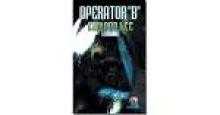 Operator B
Operator B Bullet Through Your Face (improved format)
Bullet Through Your Face (improved format) Grimoire Diabolique
Grimoire Diabolique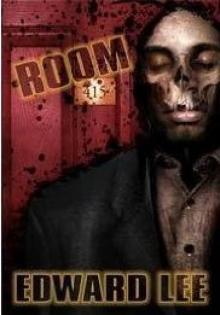 Room 415
Room 415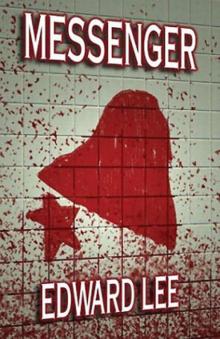 The Messenger (2011 reformat)
The Messenger (2011 reformat) Incubi
Incubi The Black Train
The Black Train House Infernal by Edward Lee
House Infernal by Edward Lee City Infernal
City Infernal Creekers
Creekers The Haunter Of The Threshold
The Haunter Of The Threshold Mangled Meat
Mangled Meat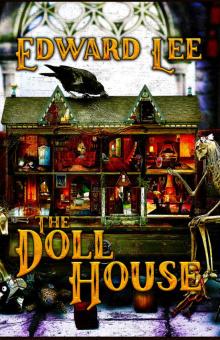 The Doll House
The Doll House Header 2
Header 2 Bullet Through Your Face (reformatted)
Bullet Through Your Face (reformatted)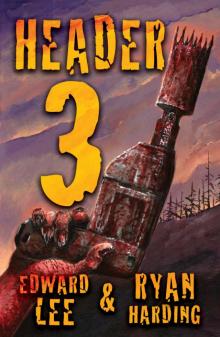 Header 3
Header 3 Infernal Angel
Infernal Angel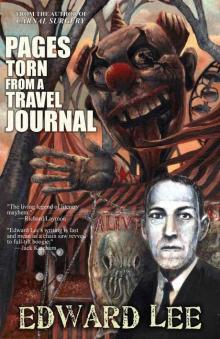 Pages Torn From a Travel Journal
Pages Torn From a Travel Journal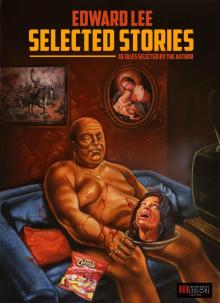 Edward Lee: Selected Stories
Edward Lee: Selected Stories The Bighead
The Bighead The Chosen
The Chosen